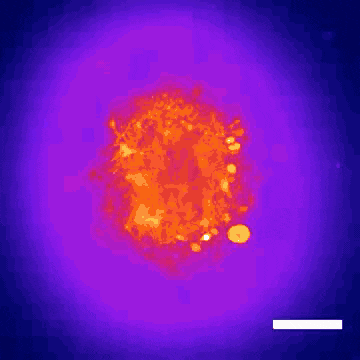About 15% of the world’s inhabitants — over a billion folks — are affected by neurological problems, from generally recognized illnesses like Alzheimer’s and Parkinson’s to a whole bunch of lesser-known, uncommon circumstances.
BrainStorm Therapeutics, a San Diego-based startup, is accelerating the event of cures for these circumstances utilizing AI-powered computational drug discovery paired with lab experiments utilizing organoids: tiny, 3D bundles of mind cells created from patient-derived stem cells. This hybrid, iterative methodology, the place scientific knowledge and AI fashions inform each other to speed up drug improvement, is named lab within the loop.
“The mind is the final frontier in trendy biology,” mentioned BrainStorm’s founder and CEO Robert Fremeau, who was beforehand a scientific director in neuroscience at Amgen and a school member at Duke College and the College of California, San Francisco. “By combining our organoid illness fashions with the ability of generative AI, we now have the power to begin to unravel the underlying complicated biology of illness networks.”
The corporate goals to decrease the failure fee of drug candidates for mind illnesses throughout scientific trials — at the moment over 93% — and establish therapeutics that may be utilized to a number of illnesses. Reaching these targets would make it quicker and extra economically viable to develop therapies for uncommon and customary circumstances.
“This alarmingly excessive scientific trial failure fee is especially as a result of incapacity of conventional preclinical fashions with rodents or 2D cells to foretell human efficacy,” mentioned Jun Yin, cofounder and chief expertise officer at BrainStorm. “By integrating human-derived mind organoids with AI-driven evaluation, we’re constructing a platform that higher displays the complexity of human neurobiology and improves the chance of scientific success.”
Fremeau and Yin imagine that BrainStorm’s platform has the potential to speed up improvement timelines, cut back analysis and improvement prices, and considerably improve the likelihood of bringing efficient therapies to sufferers.
BrainStorm Therapeutics’ AI fashions, which run on NVIDIA GPUs within the cloud, have been developed utilizing the NVIDIA BioNeMo Framework, a set of programming instruments, libraries and fashions for computational drug discovery. The corporate is a member of NVIDIA Inception, a worldwide community of cutting-edge startups.
Scientific Trial in a Dish
BrainStorm Therapeutics makes use of AI fashions to develop gene maps of mind illnesses, which they’ll use to establish promising targets for potential medication and scientific biomarkers. Organoids permit them to display screen 1000’s of drug molecules per day instantly on human mind cells, enabling them to check the effectiveness of potential therapies earlier than beginning scientific trials.
“Brains have mind waves that may be picked up in a scan like an EEG, or electroencephalogram, which measures {the electrical} exercise of neurons,” mentioned Maya Gosztyla, the corporate’s cofounder and chief working officer. “Our organoids even have spontaneous mind waves, permitting us to mannequin the complicated exercise that you’d see within the human mind on this a lot smaller system. We deal with it like a scientific trial in a dish for finding out mind illnesses.”
BrainStorm Therapeutics is at the moment utilizing patient-derived organoids for its work on drug discovery for Parkinson’s illness, a situation tied to the lack of neurons that produce dopamine, a neurotransmitter that helps with bodily motion and cognition.
“In Parkinson’s illness, a number of genetic variants contribute to dysfunction throughout totally different mobile pathways, however they converge on a standard consequence — the lack of dopamine neurons,” Fremeau mentioned. “Through the use of AI fashions to map and analyze the organic results of those variants, we are able to uncover disease-modifying therapies which have the potential to gradual, halt and even reverse the development of Parkinson’s.”
The BrainStorm group used single-cell sequencing knowledge from mind organoids to fine-tune basis fashions obtainable by means of the BioNeMo Framework, together with the Geneformer mannequin for gene expression evaluation. The organoids have been derived from sufferers with mutations within the GBA1 gene, the most typical genetic threat issue for Parkinson’s illness.
BrainStorm can also be collaborating with the NVIDIA BioNeMo group to assist optimize open-source entry to the Geneformer mannequin.
Accelerating Drug Discovery Analysis
With its proprietary platform, BrainStorm can mirror human mind biology and simulate how totally different therapies would possibly work in a affected person’s mind.
“This may be completed 1000’s of occasions, a lot faster and less expensive than could be completed in a moist lab — so we are able to slim down therapeutic choices in a short time,” Gosztyla mentioned. “Then we are able to go in with organoids and take a look at the subset of medication the AI mannequin thinks will likely be efficient. Solely after it will get by means of these steps will we really take a look at these medication in people.”

This expertise led to the invention that Donepezil, a drug prescribed for Alzheimer’s illness, may be efficient in treating Rett syndrome, a uncommon genetic neurodevelopmental dysfunction. Inside 9 months, the BrainStorm group was capable of go from organoid screening to making use of for a section 2 scientific trial of the drug in Rett sufferers. This utility was not too long ago cleared by the U.S. Meals and Drug Administration.
BrainStorm additionally plans to develop multimodal AI fashions that combine knowledge from cell sequencing, cell imaging, EEG scans and extra.
“You want high-quality, multimodal enter knowledge to design the correct medication,” mentioned Yin. “AI fashions skilled on this knowledge will assist us perceive illness higher, discover simpler drug candidates and, ultimately, discover prognostic biomarkers for particular sufferers that allow the supply of precision drugs.”
The corporate’s subsequent challenge is an initiative with the CURE5 Basis to conduct probably the most complete repurposed drug display screen thus far for CDKL5 Deficiency Dysfunction, one other uncommon genetic neurodevelopmental dysfunction.
“Uncommon illness analysis is remodeling from a high-risk area of interest to a dynamic frontier,” mentioned Fremeau. “The combination of BrainStorm’s AI-powered organoid expertise with NVIDIA accelerated computing sources and the NVIDIA BioNeMo platform is dramatically accelerating the tempo of innovation whereas decreasing the price — so what as soon as required a decade and billions of {dollars} can now be investigated with considerably leaner sources in a matter of months.”
Get began with NVIDIA BioNeMo for AI-accelerated drug discovery.

